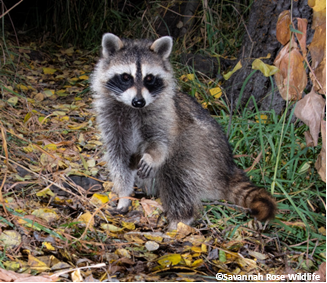Raccoons (Procyon lotor) are a common species seen throughout California in natural, rural, and urban environments. They are mostly nocturnal and typically avoid people, though they may be seen during the day while searching for food. Their diet is diverse and includes fruit, nuts, birds, fish, eggs, and small mammals, as well as pet food and trash.

Raccoons are highly adaptive and may easily become food conditioned or lose their fear of humans if provided access to food. Potential conflict with raccoons may occur due to property damage while searching for shelter or food or human health and safety concerns due to wildlife disease (e.g., distemper, rabies). Raccoons are known to leave droppings in the same location (known as a latrine) which can increase risk of exposure to humans and pets to raccoon roundworm(opens in new tab).
Prevent Potential Conflicts